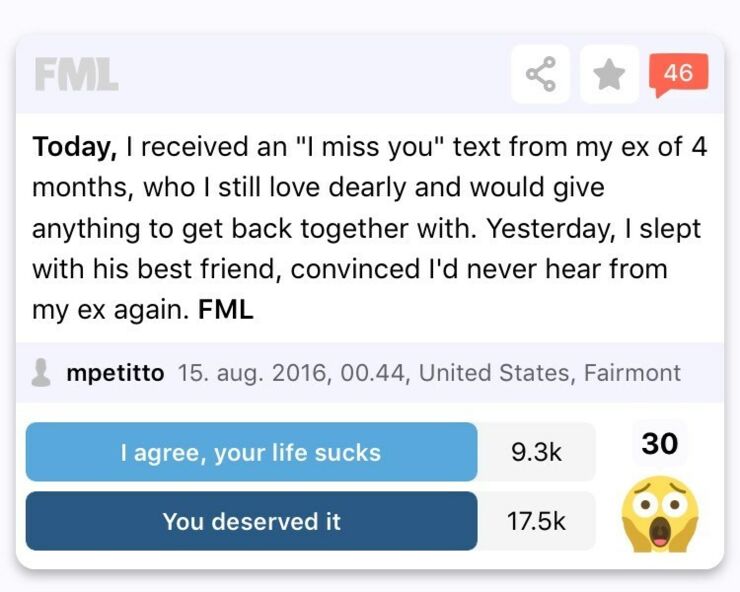Let’s get straight to the point, folks. You’ve probably stumbled upon the term "FML" while scrolling through social media, texting your friends, or even during those late-night rant sessions. But what does FML stand for? If you're scratching your head or pretending you know but secretly don’t, you’re not alone. Today, we’re going to break it down for you in a way that’s both informative and entertaining. So buckle up, because we’re diving deep into the world of acronyms and internet slang.
FML is one of those phrases that has become a staple in modern communication, whether you're using it to express frustration, laugh at life’s absurdities, or just to vent about that one bad day. But before we dive into its meanings and uses, let's first understand where it comes from and why it resonates so deeply with people today.
Now, I know what you’re thinking: “Why does this acronym matter?” Well, my friend, it matters because it’s a reflection of how we communicate in the digital age. It’s more than just three letters—it’s a cultural phenomenon that speaks to the human experience. So, let’s break it down, shall we?
Read also:Guess What Jokes The Ultimate Laughter Guide For All Ages
What Does FML Mean? The Basics
First things first, let’s get the basics out of the way. FML stands for "F*** My Life." Yes, you read that right. It’s a blunt, no-nonsense way of saying that life is throwing you curveballs, and you’re not quite sure how to handle them. The phrase is often used in situations where things go wrong, and you need a quick, cathartic way to express your frustration.
Think about it: you spill coffee on your white shirt right before an important meeting, or your car breaks down on the way to work. In moments like these, FML becomes the perfect outlet for your emotions. It’s raw, honest, and relatable, which is why it’s become so popular.
Where Did FML Come From?
Like many internet phenomena, the origins of FML are a bit murky. However, most people trace its roots back to the early 2000s when internet slang started gaining traction. The phrase gained widespread popularity through websites like "Fmylife.com," where users could share their own FML moments and connect with others who understood the struggle.
What makes FML unique is its ability to bring people together. It’s not just about complaining—it’s about finding solidarity in shared experiences. Whether you’re dealing with a minor inconvenience or a major life event, FML offers a universal language for expressing frustration.
Why Is FML So Popular?
In today’s fast-paced world, where stress and anxiety seem to be at an all-time high, FML serves as a kind of emotional release valve. It’s a way to acknowledge that life isn’t always perfect and that it’s okay to feel frustrated or overwhelmed. And let’s be honest, who doesn’t need that sometimes?
Here are a few reasons why FML has become so popular:
Read also:Domingo Snl Skit The Ultimate Guide To Laughoutloud Comedy
- It’s relatable: Everyone has those "FML" moments, whether they admit it or not.
- It’s universal: Regardless of where you’re from or what language you speak, the sentiment behind FML is understood by all.
- It’s cathartic: There’s something oddly satisfying about saying FML out loud when things go wrong.
How Is FML Used in Everyday Life?
So, how exactly do people use FML in their daily lives? Well, it depends on the context. Some people use it as a standalone phrase to express their frustration, while others incorporate it into longer sentences for added emphasis. Here are a few examples:
- “I just locked myself out of the house. FML.”
- “Guess who spilled coffee on their laptop this morning? Me. FML.”
- “FML, I can’t believe I forgot my best friend’s birthday.”
As you can see, FML is versatile and can be used in a variety of situations. It’s become such a common part of our vocabulary that it’s even made its way into pop culture, appearing in TV shows, movies, and social media.
Is FML Appropriate in All Situations?
Now, here’s the million-dollar question: is FML appropriate to use in every situation? The answer, my friend, is a resounding "it depends." While FML is a great way to express frustration, it’s important to consider your audience and the context in which you’re using it.
For example, using FML in a professional setting might not be the best idea. Your boss probably won’t appreciate hearing you say "FML" after a meeting goes south. However, in casual settings with friends or family, it’s perfectly fine to let loose and vent about your day.
When to Use FML: A Quick Guide
To help you navigate the world of FML, here’s a quick guide on when it’s appropriate to use:
- With friends and family: Absolutely! They’ll probably laugh and commiserate with you.
- On social media: Go for it! Just make sure you’re okay with sharing your frustrations publicly.
- In professional settings: Proceed with caution. Unless you’re in a super laid-back environment, it’s probably best to keep it professional.
Common Misconceptions About FML
Despite its popularity, there are still a few misconceptions about FML that need to be addressed. For starters, some people think that using FML means you’re giving up or being negative. But that’s not necessarily true. In fact, FML can be a powerful way to acknowledge your feelings and move forward.
Another misconception is that FML is only used by younger generations. While it’s true that millennials and Gen Z have embraced the acronym, people of all ages use it to express frustration and find common ground.
Debunking the Myths: Why FML Is More Than Just an Acronym
Let’s take a moment to debunk some of the myths surrounding FML:
- Myth: FML is just a way to complain. Reality: It’s a way to acknowledge and process your emotions.
- Myth: Only young people use FML. Reality: People of all ages use it to connect with others.
- Myth: Using FML means you’re stuck in a negative mindset. Reality: It’s a tool for emotional release and resilience.
How Can You Use FML in a Positive Way?
Believe it or not, FML can actually be used in a positive way. Instead of focusing solely on the negative aspects of a situation, you can use FML as a starting point for problem-solving and growth. For example, if you say "FML, I just failed my exam," you can follow it up with "But I know what I need to work on for next time."
By reframing FML as a tool for self-reflection, you can turn frustration into motivation. It’s all about how you choose to use it.
Turning FML Into YOLO: A Path to Positivity
Here’s a fun exercise: the next time you catch yourself saying FML, try flipping it around and turning it into a YOLO (You Only Live Once) moment. For example:
- “I just got rejected from my dream job. FML.” → “This is my chance to explore new opportunities. YOLO!”
- “I totally bombed that presentation. FML.” → “I learned something valuable today. YOLO!”
It’s all about perspective, folks. And who knows? You might just find that turning FML into YOLO becomes your new favorite way to approach life’s challenges.
Conclusion: Embrace the Power of FML
So there you have it, folks. We’ve covered what FML stands for, where it came from, why it’s so popular, and how you can use it in a positive way. Whether you’re using it to vent about a bad day or to connect with others who understand the struggle, FML has become a powerful tool in our modern lexicon.
But remember, life isn’t all about the bad days. For every FML moment, there’s a YOLO moment waiting to happen. So the next time you find yourself saying FML, take a deep breath, acknowledge your feelings, and then get back out there and make the most of it.
And hey, if you found this article helpful, don’t forget to share it with your friends! Who knows? You might just help someone else navigate the world of acronyms and find a little bit of positivity along the way.
Table of Contents


